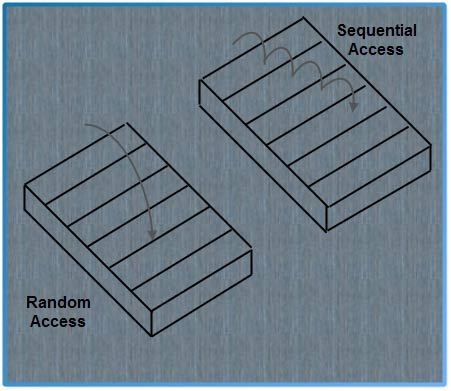In computing, an access method is a program or a hardware mechanism that moves data between the computer and an outlying device such as a hard disk (or other form of storage) or a display terminal.
The term is sometimes used to refer to the mechanics of placing or locating specific data at a particular place on a storage medium and then writing the data or reading it. It is also used to describe the way that data is located within a larger unit of data such as a data set or file.
There are two type of access method random access and sequential access.
 To go from point A to point Z in a sequential-access system, you must pass through all intervening points. In a random-access system, you can jump directly to point Z.Disks are random access media, whereas tapes are sequential access media.
To go from point A to point Z in a sequential-access system, you must pass through all intervening points. In a random-access system, you can jump directly to point Z.Disks are random access media, whereas tapes are sequential access media.
The terms random access and sequential access are often used to describe data files. A random-access data file enables you to read or write information anywhere in the file. In a sequential-access file, you can only read and write information sequentially, starting from the beginning of the file.
Both types of files have advantages and disadvantages. If you are always accessing information in the same order, a sequential-access file is faster. If you tend to access information randomly, random access is better.
 Dinesh Thakur holds an B.C.A, MCDBA, MCSD certifications. Dinesh authors the hugely popular
Dinesh Thakur holds an B.C.A, MCDBA, MCSD certifications. Dinesh authors the hugely popular